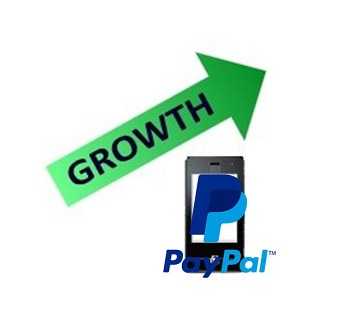The mobile space is driving the evolution of commerce as a whole
It has been 10 years since PayPal launched its first mobile payments service. To celebrate the anniversary of the service, the company has released information to show its exponential growth over its long history. This information is visualized in a chart that was released by PayPal earlier this week. According to PayPal CEO Dan Schulman, the mass adoption of mobile commerce has created a significant shift in the way people spend money. This has begun to change the nature of commerce with consumers relying more heavily on the digital space.
$66 billion in mobile transactions were processed by PayPal in 2015
According to PayPal, one-third of the 4.9 billion payments processed by the company last year were made through mobile devices. This accounts for some $66 billion in mobile transactions. The company believes that the growing prominence of mobile payments services will lead to a change in the commerce space over the next decade. This change may accelerate as more businesses begin supporting mobile transactions and shoppers relying on their smartphones and tablets.
Global mobile payments could reach $4 trillion by 2020
 In the United States, mobile commerce exceeded $100 billion in transactions in 2014. These transactions have continued to grow since, with more consumers becoming comfortable with the prospect of using mobile devices to make purchases. By 2020, mobile transactions could reach more than $4 trillion globally, according to IDC, a market research and analysis firm. With new payment services becoming more secure, more consumers are likely to participate in the mobile commerce space, giving PayPal and other companies new opportunities to expand their mobile initiatives.
In the United States, mobile commerce exceeded $100 billion in transactions in 2014. These transactions have continued to grow since, with more consumers becoming comfortable with the prospect of using mobile devices to make purchases. By 2020, mobile transactions could reach more than $4 trillion globally, according to IDC, a market research and analysis firm. With new payment services becoming more secure, more consumers are likely to participate in the mobile commerce space, giving PayPal and other companies new opportunities to expand their mobile initiatives.
Improved security makes consumers more comfortable with mobile commerce
Consumer adoption of mobile commerce has been heavily influenced by the security and convenience of payment services. Many had consider mobile transactions to be risky as they believed their financial information would be exposed to theft and exploitation. Indeed, some services have been impacted by major data breaches in the past, but these events have served to strengthen security in recent years, making mobile payments more attractive to consumers.
The rise of mobile shopping is changing the way consumers behave in the digital space
Consumer behavior is beginning to have a significant impact on digital commerce. Many consumers are becoming more mobile-centric, relying on their smartphones and tablets to research and purchase products that they are interested in. A recent report from Forrester Research shows that merchants may have to begin focusing more heavily on the mobile space as a result, as mobile commerce is becoming a very powerful force in the retail space, especially as more consumers become comfortable with the concept.
More consumers are beginning to use their devices in physical stores
According to the report from Forrester Research, 82% of consumers in the United States make purchasing decisions while in a physical store, with 56% of these consumers using their smartphones to check prices online. The report also shows that the capabilities of mobile devices are also changing consumer behavior. When in stores, more consumers are beginning to scan barcodes with their mobile devices in order to read reviews and compare prices. Consumers are also scanning codes to take advantage of special deals being offered by merchants.
Loyalty programs may help secure the growth of mobile shopping
 Mobile commerce has become a very significant concept for the retail industry. One-third of all e-commerce transactions made throughout the world are now done via a mobile device. A recent report from Goldman Sachs predicts that mobile commerce will account for nearly half of all e-commerce transactions made worldwide by 2018. As this sector continues to grow, loyalty programs may become much more important to retailers than they already are. Approximately 46% of consumers are more willing to provide personal information if they can make use of a loyalty program of some sort.
Mobile commerce has become a very significant concept for the retail industry. One-third of all e-commerce transactions made throughout the world are now done via a mobile device. A recent report from Goldman Sachs predicts that mobile commerce will account for nearly half of all e-commerce transactions made worldwide by 2018. As this sector continues to grow, loyalty programs may become much more important to retailers than they already are. Approximately 46% of consumers are more willing to provide personal information if they can make use of a loyalty program of some sort.
Consumers are less likely to share personal information outside loyalty programs
While loyalty programs may provide merchants with more information about their customers, these people have limits when it comes to the information they want to provide. Outside of loyalty programs, consumers are less likely to share personal information. This is something that retailers will have to keep in mind once they begin focusing more heavily on the mobile commerce space in the future.
 In the United States, mobile commerce exceeded $100 billion in transactions in 2014. These transactions have continued to grow since, with more consumers becoming comfortable with the prospect of using mobile devices to make purchases. By 2020, mobile transactions could reach more than $4 trillion globally, according to IDC, a market research and analysis firm. With new payment services becoming more secure, more consumers are likely to participate in the mobile commerce space, giving PayPal and other companies new opportunities to expand their mobile initiatives.
In the United States, mobile commerce exceeded $100 billion in transactions in 2014. These transactions have continued to grow since, with more consumers becoming comfortable with the prospect of using mobile devices to make purchases. By 2020, mobile transactions could reach more than $4 trillion globally, according to IDC, a market research and analysis firm. With new payment services becoming more secure, more consumers are likely to participate in the mobile commerce space, giving PayPal and other companies new opportunities to expand their mobile initiatives.
 Mobile commerce has become a very significant concept for the retail industry. One-third of all e-commerce transactions made throughout the world are now done via a mobile device. A recent report from Goldman Sachs predicts that mobile commerce will account for nearly half of all
Mobile commerce has become a very significant concept for the retail industry. One-third of all e-commerce transactions made throughout the world are now done via a mobile device. A recent report from Goldman Sachs predicts that mobile commerce will account for nearly half of all 